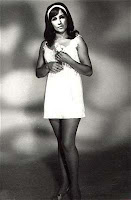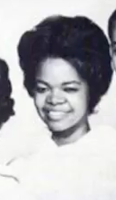 |
| Lonnie Donegan |
The British Invasion, 1956-1963
This is a list of UK artists who appeared on the US charts from the beginning of the rock 'n' roll era until the chart debut of The Beatles' #1 hit "I Want to Hold Your Hand" in January 1964.
The Beatles' actual US chart debut was "From Me To You" in 1963, but it barely registered on the charts, so it can't be considered the catalyst for the British Invasion that "I Want to Hold Your Hand" was.
Although the British Invasion marked an explosion of interest in and commercial success for British artists in the United States, British artists had already begun to have an increasing presence on the US charts since the mid '50s, as seen below.
The British hit-makers, like their American counterparts at that time, were wide ranging in style, from easy listening to rock 'n' roll and from sophisticated pop to rootsy folk and skiffle.
As for firsts, the first British artist to have a #1 hit in the US was Vera Lynn with "Auf Wiederseh'n Sweetheart" in 1952, and the first British group to have a #1 hit in the US was The Tornados with "Telstar" in 1962.
If I've forgotten anyone (and I'm sure I have), let me know and I'll add them to the list.
Note: All chart positions are from the Billboard Hot 100 or "Bubbling Under" charts unless otherwise indicated. Artists are listed in chronological order by their first hit.
Lonnie
Donegan
- “Rock Island Line” (#8, 1956; again in 1961 in Music Vendor and Cash Box)
- “Lost
John” (#58, 1956)
- "My Old Man's a Dustman" (#118 in Music Vendor, 1960)
- “Does Your Chewing Gum Lose Its Flavor (On the Bedpost Over Night)” (#5, 1961)
The
Beverly Sisters
- “Greensleeves” (#41, 1956)
Anne Shelton
- "Lay Down Your Arms" (#59, 1956)
Vera
Lynn (also had US hits in the 1940s and early '50s)
- “Such A Day” (#96, 1956)
- “Don’t Cry My Love (The Faithful Hussar)” (#55, 1957)
Cyril
Stapleton
- “The Italian Theme” (#25, 1956)
- "Forgotten Dreams" (#43 in Cash Box, #45 in Music Vendor, 1957)
- “The Children’s Marching
Song” (#13, 1959)
Russ
Hamilton
- “Rainbow” (#3, 1957)
- "Wedding Ring" (#81 in Music Vendor, 1957)
- "My Mother's Eyes" (#83 in Music Vendor, 1958)
Laurie
London
- “He’s Got The Whole World (In His Hands)” (#1, 1958)
- "I Gotta Robe" (#80 in Music Vendor, 1958)
- "Pretty Eyed Baby" (#106 in Music Vendor, 1959)
Frankie
Vaughan
- “Judy” (#22, 1958)
- "Hercules" (#118 in Music Vendor, #141 in Cash Box, 1962)
Reg
Owen
- “Manhattan Spiritual” (#10, 1958)
- "Down by the Riverside" (#111 in Music Vendor, 1959)
Mike Preston
- "A House, A Car and a Wedding Ring" (#93, but #57 in Cash Box, 1958)
Cliff
Richard
- “Living Doll” (#30, 1959)
- "Dynamite" (#115 in Cash Box, 1959)
- "Travellin' Light" (#107 in Music Vendor, 1959)
- "Theme for a Dream" (#112 in Cash Box, 1961)
- "Wonderful to Be Young" (#135 in Music Vendor, 1962)
- "Lucky Lips" (#62, 1963) (debuted the same week as The Beatles' "From Me to You")
- "It's All in the Game" (#25, 1963)
Chris
Barber's Jazz Band
- “Petite Fleur” (#5, 1959)
Marty
Wilde
- "You Don't Know" (#88 in Music Vendor, #147 in Cash Box, 1961)
- “Walkin’ Back To Happiness” (#100, 1961)
Matt
Monro
- “My Kind Of Girl” (#18, 1961)
- "Why Not Now" (#92, 1961)
- "Softly As I Leave You" (#116, 1962; charted again in 1964)
- "The Girl I Love" (#146 in Music Vendor, 1963)
Eden
Kane
- “Well, I Ask You” (#119, 1961)
Hayley
Mills
- "Let's Get Together” (#8, 1961)
- “Johnny Jingo” (#21, 1962)
- "Ching-Ching and a Ding Ding Ding" (#118, 1962)
- "Castaway" (#110 in Music Vendor, #111 in Cash Box, 1963)
Shirley
Bassey
- "You'll Never Know" (#89 in Music Vendor, #110 in Cash Box, 1961)
- “Reach For The Stars” (#120, 1961)
Mr.
Acker Bilk
- "Summer Set" (#104, 1960)
- "Stranger on the Shore” (#1, 1962)
- “Dardanella (Part 1)" (#105, 1962)
- “Above The Stars” (#59, 1962)
- "Limelight" (#92, 1962)
- "Underneath the Arches" (#120 in Music Vendor, #129 in Cash Box, 1963)
David
Rose
- "Holiday for Trombones" (#84, 1957)
- "Calypso Melody" (#42, 1957)
- "Swinging Shepherd Blues" (#47, 1958)
- "How High the Moon" (#81 in Music Vendor, 1958)
- "Like Young" (#46, 1959)
- "Young and Tender" (#113 in Music Vendor, 1959)
- “The Stripper” (#1, 1962)
- “Black and Tan Fantasy" (#96 in Music Vendor, 1962)
- "The Theme from 'The Wonderful World of the Brothers Grimm'" (#100 in Music Vendor, 1962)
- "The Runway" (#95 in Music Vendor, 1963)
- "How the West Was Won" (#120 in Music Vendor, 1963)
The
Tornados
- “Telstar” (#1, 1962)
- "Ridin' the Wind" (#63, 1963)
- "Globetrottin'" (#87 in Music Vendor, #93 in Cash Box, 1963)
- "Like Locomotion" (#119, 1963)
- "Robot" (#115 in Music Vendor, 1963)
- "The Ice Cream Man" (#103 in both Cash Box and Music Vendor, 1963)
Victor
Feldman Quartet
- “A Taste Of Honey” (#88, 1962)
Kenny
Ball and His Jazzmen
- “Midnight In Moscow” (#2, 1962)
- "March of the Siamese Children" (#88, 1962)
- "The Green Leaves of Summer" (#87, 1962)
- "Heartaches" (#119, 1963)
Charlie
Drake
- “My Boomerang Won’t Come Back” (#21, 1962)
Frank
Ifield
- “I Remember You” (#5, 1962)
- “Lovesick Blues” (#44, 1962)
- "The Wayward Wind" (#104, 1963)
- "I'm Smiling Now" (#132 in Music Vendor, 1963)
- "Nobody's Darlin' but Mine" (#142 in Music Vendor, 1963)
- "I'm Confessin' That I Love You" (#58, 1963)
- "Please" (#71, 1963)
The
Springfields
- “Silver Threads And Golden Needles” (#20, 1962)
- “Dear
Hearts And Gentle People” (#95, 1962)
- "Gotta Travel On" (#114, 1962)
- "Waf-Woof" (#149 in Music Vendor, 1963)
- "Island of Dreams" (#129, 1963)
The
Caravelles
- “You Don’t Have To Be A Baby To Cry” (#3, 1963)



















